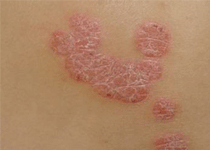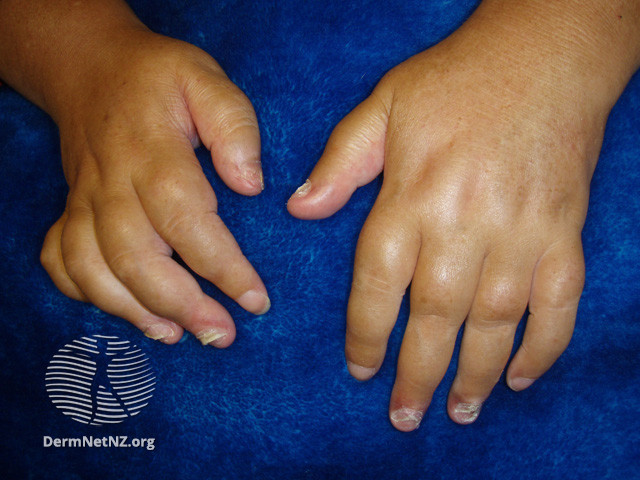Joseph R. Anticaglia, MD
Medical Advisory Board
Psoriatic arthritis (PsA) is a type of chronic inflammatory arthritis that causes joint swelling, pain and stiffness. It’s associated with psoriasis, a skin condition characterized by red, thick, itchy, scaly patches. Both inflammatory arthritis and psoriasis are an autoimmune disease, meaning the immune system mistakenly attacks its own healthy tissues leading to joint inflammation and skin lesions. Approximately eighty per cent of the time, psoriasis precedes the onset of arthritis. PsA can occur at any age, but most commonly presents in people between the ages of 30 and 50.
Symptoms and Signs
Symptoms of PsA vary from person to person. Arthritic symptoms are usually asymmetric with “sausage-like swelling” of fingers and toes (dactylitis). There may be pain, stiffness, and swelling in one or more of the joints. Psoriatic symptoms include nail changes, such as discoloration, nail pitting i. e., tiny dents in the nail, or separation from the nail bed. The red scaly skin lesions often appear on the scalp, elbow or knees. People may experience stress, anxiety, fatigue, itchiness and discomfort.
Cause
The exact cause of PsA and why this autoimmune disease attacks healthy tissues is not fully understood. It happens when immature skin cells rise to the surface of the skin and form thick patches. People with psoriatic arthritis often have a family history of the disease.
Several factors can aggravate or trigger psoriatic arthritis symptoms including stress, obesity, infection, and injury to the affected joints. Additionally, certain medications, for instance, those used to treat high blood pressure may worsen psoriasis.

Diagnosis
Diagnosis is based on medical history and clinical findings. Doctors look for thick, red patches of skin topped with flakes of silvery-white scales. They also search for joint swelling, stiffness and tenderness. A blood test evaluates the RF, rheumatoid factor. It is present in rheumatoid arthritis but not in PsA.
Other blood tests (ESR and CRP) signify inflammation which may be elevated in PsA. A rare X-ray finding in advanced cases of PsA is the so called “pencil in cup’ deformity where the end of the bone deteriorates to a sharp-like point.

Treatment
There is no cure for psoriatic arthritis. Treatment is aimed at easing the psoriatic skin condition and managing the arthritic joint symptoms. Just as PsA varies from mild to severe, so does the treatment vary from person to person.
NSAIDs plus heat and ice are usually enough for mild joint disease. Topical treatments and/or phototherapy-ultraviolet light B (UVB) are often sufficient for mild psoriasis. Non-drug treatments include physical therapy, occupational therapy, (UVB) and an exercise program
People with a more severe form of PsA, the medications known as disease-modifying antirheumatic drugs (DMARDs) have shown to relieve the symptoms of psoriasis and arthritis; however, with the warning of serious side effects.
Comorbidities
“More than half of people with psoriatic arthritis have at least one other related medical condition or comorbidity.” Such comorbidities according to the Arthritis Foundation include “obesity” diabetes, metabolic syndrome and non-alcoholic fatty liver disease all of which raise the risk of cardiovascular disease, the most common PsA comorbidity.
Psoriasis impacts millions of people in the U. S. About 3 out of 10 people with psoriasis will develop arthritis. The more severe the psoriasis, the greater the incidence of PsA. It’s advisable to consult a rheumatologist, in collaboration with a dermatologist to best manage this debilitating disease.
References
- Bhakti Shah, MD; American College of Rheumatology; Psoriatic Arthritis, 2023
- David B. Hellman MD, John B. Imboden Jr. MD ; Rheumatologic, Immunologic and Allergic Disorders; Diagnosis and Treatment, Lange, 2018
- Arthritis Foundation; Metabolic Comorbidities of PsA; Live yes Arthritis Podcast
- Vivekanand Tiwari; Lawrence H. Brent; Psoriatic Arthritis; StatPearls [Internet], January 14, 2023.
- Vanessa Ngan, 2007, Updated by Dr Douglas White, 2017; What Is Dactylitis? Dermnet, 2017
- Light Therapy for Psoriasis, Phototherapy; National Psoriasis Foundation, December 22, 2022
Addendum

Glossary
Erythrocyte sedimentation rate (ESR) and C-reactive protein (CRP) are blood tests that show if you have a medical condition causing inflammation.
HLA-B27 is a protein found on the surface of white blood cells. It’s used to diagnose spondyloarthritis, an inflammation in the spine and joints.
Comorbidity is the simultaneous presence of two or more diseases or medical conditions in a patient. The comorbidities of PsA, in addition to the above, include eye inflammation (conjunctivitis, uveitis), inflammatory bowel disease (IBD), anxiety and depression.
This article is intended solely as a learning experience. Please consult your physician for diagnostic and treatment options.

